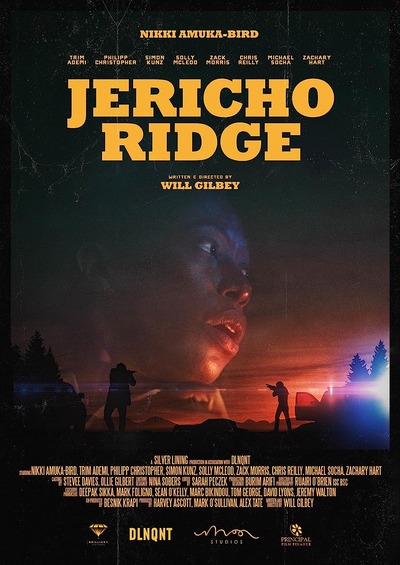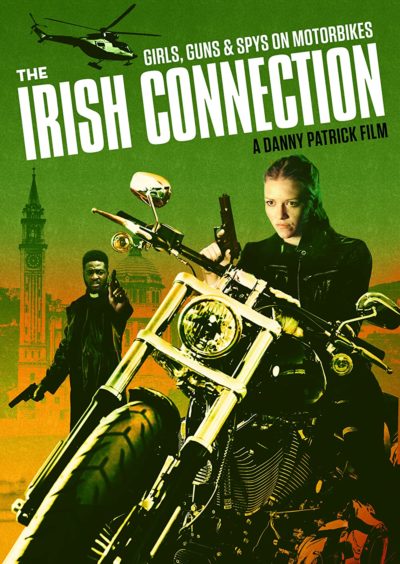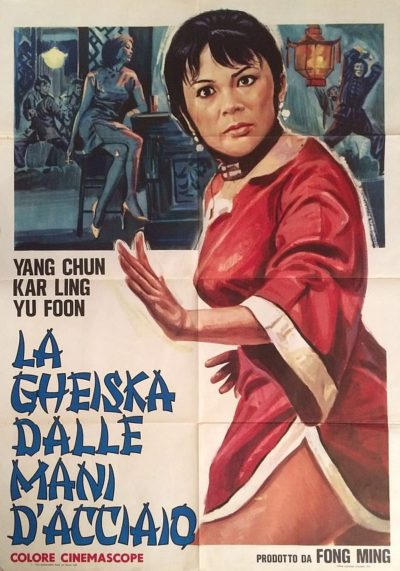★★
“Hot, Cross buns.”
 To be honest, I enjoyed this a good bit more than the rating above would indicate – probably another star or so. But I have a particular tolerance for cinema with rough edges, which I know not everyone will share. This is such an entity. I can’t really recommend it, since most people won’t be able to get past the micro-budget anesthetics, which the film rarely bothers even to try and hide. But I could appreciate the obvious passion that went into this. Put it this way, if I had twenty quid with which to make a movie, it could end up looking something like this. Probably not with such a kick-ass poster though.
To be honest, I enjoyed this a good bit more than the rating above would indicate – probably another star or so. But I have a particular tolerance for cinema with rough edges, which I know not everyone will share. This is such an entity. I can’t really recommend it, since most people won’t be able to get past the micro-budget anesthetics, which the film rarely bothers even to try and hide. But I could appreciate the obvious passion that went into this. Put it this way, if I had twenty quid with which to make a movie, it could end up looking something like this. Probably not with such a kick-ass poster though.
I suspect we credit Meadows there, since it seems he did everything else. Specifically, he wrote, directed, shot, edited, produced this and was stunt co-ordinator too. Plus he plays foul-mouthed gangster Danny McQueen. Unlike most such cases, there’s no obvious deficiency in any of these areas. It’s all adequate: if there’s a weakness, I’d say it is the audio, which is especially weak in the fight sequences. “Seventies kung-fu movie” bad. Mind you, the fights themselves occasionally are two people, clearly trying to hit each other’s weapons, rather than the opponent. On the other hand, there are times where things do come together reasonably well. The titular heroine (Clatworthy) looks the part and seems competent enough for a job as an assassin working on behalf of the British government… Or is she?
The story-line beyond that is kinda fractured. It’s described as an anthology, and there do appear to be various “chapters”, which are or more or less loosely connected to Scarlett’s quest for her own identity. And her survival, since it seems that some parties are keen to dispose of her, because that whole “identity” thing poses a potential threat to said parties. There’s a side-plot about a woman who is seeking revenge for all the abuse she suffered at the hands of the church, which does at least give us the immortal line, “No, I’m deadly serious. We’re dealing with a fucking killer nun!” This kind of self-aware sarcasm is likely when this is at its most effective.
This needs to embrace its exploitative elements to a greater degree, though I wonder if the version I saw (on Tubi) was edited. I did read one review which said, it “opens rather salaciously with a truly bizarre, literally titillating, yet oddly engaging fight sequence, not for the children. In fact this movie if rated would probably be an NC:17.” Not the movie I saw. One rather chaste shower scene was about the extend of the mature content, and the violence – lots of digital muzzle-flash – is along the same lines. That CGI does play against the grindhouse aesthetic for which Meadows is definitely aiming, down to the fake film scratches. As a debut, however, this is not without premise, so let’s see where he goes from here.
Dir: Dean Meadows
Star: Kat Clatworthy, Maria Lee Metheringham, Tayah Kansik, Hannah Farmer





 In one of the odder remakes I’ve seen in a while, this is a repurposing of the French 2013 film, Les reines du ring, which translates as “Queens of the Ring”. The core concept is retained, but the location is changed from France to Mexico, and the idea is expanded to a ten-part series. These changes make for a bit of a mixed blessing. Pro wrestling is certainly a more well-established part of the cultural landscape in Mexico, where lucha libre is extremely popular. On the other hand, the multiplication of the running time a factor of about four, leads to the necessary injection of superfluous storylines, which definitely reduced the entertainment value as far as I was concerned. It’s less a wrestling soap-opera, than a soap-opera with wrestling in it.
In one of the odder remakes I’ve seen in a while, this is a repurposing of the French 2013 film, Les reines du ring, which translates as “Queens of the Ring”. The core concept is retained, but the location is changed from France to Mexico, and the idea is expanded to a ten-part series. These changes make for a bit of a mixed blessing. Pro wrestling is certainly a more well-established part of the cultural landscape in Mexico, where lucha libre is extremely popular. On the other hand, the multiplication of the running time a factor of about four, leads to the necessary injection of superfluous storylines, which definitely reduced the entertainment value as far as I was concerned. It’s less a wrestling soap-opera, than a soap-opera with wrestling in it. I was going to go with “Tree’s company” as the tagline, before I realized I’ve actually used that in three separate, forest-set movies. So I decided to adjust it slightly, and what’s above is indeed very apt. There is a cast of three (3) and the entire thing unfolds in the woods. There isn’t a single set or interior shot in the whole film. Indeed, if you’d asked me, I’d have said this had all the hallmarks of a COVID-era project, designed to be shot with a small cast and in a nicely sanitary, outdoor location. Not so, even though Tubi dates it as 2020. There was a screening in April 2019, well before anyone had heard of Wuhan, and the IMDb gives it a year of 2017.
I was going to go with “Tree’s company” as the tagline, before I realized I’ve actually used that in three separate, forest-set movies. So I decided to adjust it slightly, and what’s above is indeed very apt. There is a cast of three (3) and the entire thing unfolds in the woods. There isn’t a single set or interior shot in the whole film. Indeed, if you’d asked me, I’d have said this had all the hallmarks of a COVID-era project, designed to be shot with a small cast and in a nicely sanitary, outdoor location. Not so, even though Tubi dates it as 2020. There was a screening in April 2019, well before anyone had heard of Wuhan, and the IMDb gives it a year of 2017. I had quite forgotten that Rose was part of John Wick: Chapter 2 in 2017. That
I had quite forgotten that Rose was part of John Wick: Chapter 2 in 2017. That  I think I can point almost to the exact point where this one jumped the shark. It had started well enough. Jamie Austen works for the CIA, taking down human traffickers across the world, in conjunction with a non-governmental organization called Save the Girls. Now, I have questions here: why exactly would the CIA
I think I can point almost to the exact point where this one jumped the shark. It had started well enough. Jamie Austen works for the CIA, taking down human traffickers across the world, in conjunction with a non-governmental organization called Save the Girls. Now, I have questions here: why exactly would the CIA  After a year which has been filled with disappointments and films which have failed to generate much reaction beyond a mild “Meh,” it’s nice to see one which certainly surpasses expectations. Indeed, with about two months left to go in 2023, this would certainly be a finalist for GWG Film of the Year, were there to be such an award, and potentially could walk away with that hypothetical trophy. It’s the kind of movie which, even when you know exactly what’s about to happen, still delivers in a way that can generate an undeniable reaction. Considering my expectations going in were not much more than the made-for-TV level – this being a BET channel exclusive – it surpassed those greatly.
After a year which has been filled with disappointments and films which have failed to generate much reaction beyond a mild “Meh,” it’s nice to see one which certainly surpasses expectations. Indeed, with about two months left to go in 2023, this would certainly be a finalist for GWG Film of the Year, were there to be such an award, and potentially could walk away with that hypothetical trophy. It’s the kind of movie which, even when you know exactly what’s about to happen, still delivers in a way that can generate an undeniable reaction. Considering my expectations going in were not much more than the made-for-TV level – this being a BET channel exclusive – it surpassed those greatly. The heroine is
The heroine is  At times this feels more like a fancy dress party than a film. People dressed up as nuns. People dressed up as clowns. People dressed as priests. This probably isn’t surprising, considering that it feels like Patrick is cosplaying as a film-maker. There’s little or no evidence to indicate he knows how to construct a coherent or interesting narrative. Instead, he proceeds by simply dropping in scenes which, I gueaa, are supposed to be “amusing”, without rhyme or reason. I called Aureille the heroine above, though there’s precious little to make her so. I presumed she is supposed to be the “good guy”, because there are no other credible candidates for that role, so she earns it by default.
At times this feels more like a fancy dress party than a film. People dressed up as nuns. People dressed up as clowns. People dressed as priests. This probably isn’t surprising, considering that it feels like Patrick is cosplaying as a film-maker. There’s little or no evidence to indicate he knows how to construct a coherent or interesting narrative. Instead, he proceeds by simply dropping in scenes which, I gueaa, are supposed to be “amusing”, without rhyme or reason. I called Aureille the heroine above, though there’s precious little to make her so. I presumed she is supposed to be the “good guy”, because there are no other credible candidates for that role, so she earns it by default. I can’t recall seeing an action heroine movie with
I can’t recall seeing an action heroine movie with  While technically solid, and occasionally looking quite good, this may be the laziest scripting I have seen in a movie for a long time. I feel I may have lost actual IQ points through the process of watching it, such is the degree of stupidity which this provides. The heroine is Mina (Black-D’Elia), a college student whose life is upended when she and her little sister narrowly escape a home invasion by Arab terrorists, in which both her parents are killed. She’s rescued by intelligence agent Olivia (Leonard), who tells her she’s the only heir of an Afghani warlord, Khalid (Arditti). Her mother betrayed him, and had to change her identity: he finally caught up with the family, and wants his daughter back.
While technically solid, and occasionally looking quite good, this may be the laziest scripting I have seen in a movie for a long time. I feel I may have lost actual IQ points through the process of watching it, such is the degree of stupidity which this provides. The heroine is Mina (Black-D’Elia), a college student whose life is upended when she and her little sister narrowly escape a home invasion by Arab terrorists, in which both her parents are killed. She’s rescued by intelligence agent Olivia (Leonard), who tells her she’s the only heir of an Afghani warlord, Khalid (Arditti). Her mother betrayed him, and had to change her identity: he finally caught up with the family, and wants his daughter back. I’m just going to begin by quoting the opening credit titles. Spelling, grammar and punctuation as received. “At the early stage of Republic of China, Yuan Hsi Hai wanted to rebel the democratic government & be the king. But there were 300,000 soldiers at Yuan Wan under the command of General Tsai obstructed his desire, so he cheated General Tsai to Peking & confined his movements. So Yuan who lived in Chu Jen Hall could fulfil his ambition but…” I reproduce this because, to a large extent, that’s everything I’ve got in terms of the over-arching plot here. It’s all about Tsai (Kwan) getting out of the city, in order to lead his troops and, presumably, frustrate Yuan’s dictatorial ambitions.
I’m just going to begin by quoting the opening credit titles. Spelling, grammar and punctuation as received. “At the early stage of Republic of China, Yuan Hsi Hai wanted to rebel the democratic government & be the king. But there were 300,000 soldiers at Yuan Wan under the command of General Tsai obstructed his desire, so he cheated General Tsai to Peking & confined his movements. So Yuan who lived in Chu Jen Hall could fulfil his ambition but…” I reproduce this because, to a large extent, that’s everything I’ve got in terms of the over-arching plot here. It’s all about Tsai (Kwan) getting out of the city, in order to lead his troops and, presumably, frustrate Yuan’s dictatorial ambitions.